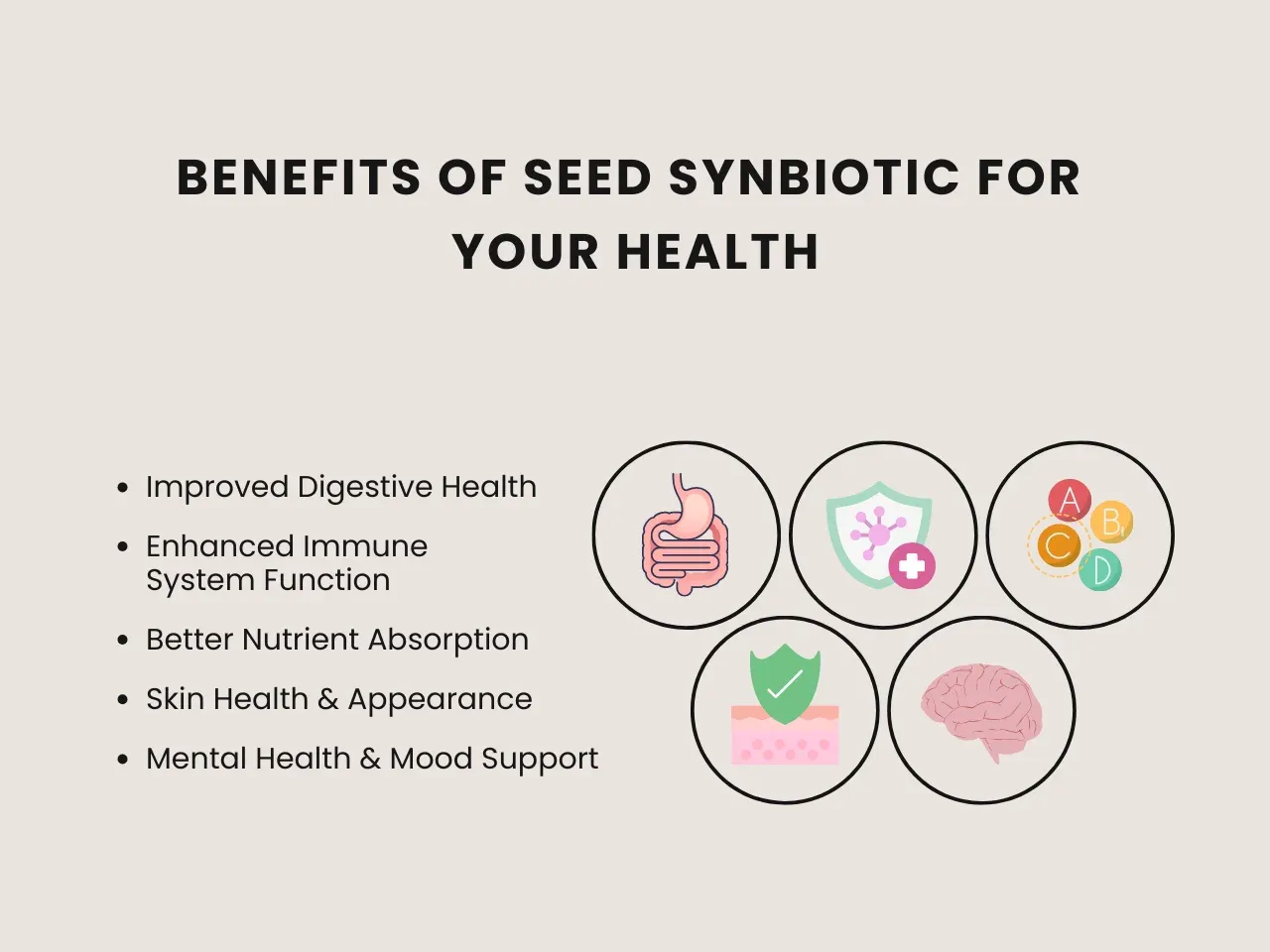
Seed synbiotic stand out for their powerful combination of probiotics and prebiotics, which enhance overall health. This unique blend offers a comprehensive approach to gut health, supporting both improved digestion and general well-being.
At Nudge, a leading digestive health supplement company, we have developed an all-in-one solution incorporating Seed synbiotics into a person's wellness routine. Our all-in-one formula contains everything needed to support a balanced gut microbiome for healthy digestion and overall vitality.
With our scientific study backed by clinical trials, we’ll explore the numerous benefits of Seed synbiotics for gut health optimization. We’ll cover how Seed synbiotics enhance digestive function, improve nutrient absorption, and more. By the end, you'll see how Seed synbiotics can transform your gut health and well-being, empowering informed choices for a healthier lifestyle.
Let's get started!
Improved Digestive Health with Seed Synbiotic

Seed synbiotic supplements support a healthy gut microbiome, vital for digestive health. They include specific probiotic strains that help balance good and bad bacteria to the required ratio for optimal digestion. A balanced gut microbiota enhances nutrient absorption, prevents harmful bacteria growth, and stabilizes digestion and immune function.
Seed synbiotics introduce live microorganisms that help alleviate bloating, gas, and irregular bowel movements by promoting smoother muscle contractions within the digestive tract. Clinical trials back their effectiveness in managing conditions like irritable bowel syndrome, validating these supplements’ health benefits.
Long-Term Digestive Support with Prebiotics
Seed synbiotics go beyond short-term relief; they offer long-term digestive health benefits by including prebiotics. These prebiotics nourish the beneficial bacteria, helping them thrive in your gut over time. Prebiotics support a more substantial gut barrier and muscular gut, such as conditions that promote better-continued digestion by feeding these good bacteria in your intestines.
Enhanced Immune System Function

The gut microbiome plays a crucial role in immune system function, as a significant portion of your immune cells reside in the gut. A healthy gut directly influences the body’s ability to defend against harmful pathogens. The good-to-bad ratio in the gut microbiome regulates the immune response, ensuring appropriate intensity while minimizing excess inflammation and immunological issues.
This seed synbiotic formulation fosters a diverse and balanced microbiome, which is essential for immune resilience. Intaking scientifically validated probiotic strains in your system will enhance microbial diversity, allowing the body to recognize noxious invaders better and fight them off.
Reducing Inflammation and Supporting Infection Defense
Seed Synbiotics promote a balanced microbiome that strengthens your immune defenses and helps reduce chronic inflammation. Probiotics keep the gut barrier tight, blocking all typically harmful elements from getting into the bloodstream and triggering the immune system for no good reason.
This protection aids your body in fighting against infectious diseases and reducing inflammation that might lead to other health conditions. Including elements found in breast milk further enhances the efficacy of these synbiotics, creating a robust foundation for overall health.
Better Nutrient Absorption
A healthy gut optimizes nutrient absorption, ensuring efficient uptake of probiotic vitamins, minerals, and essential fatty acids. Seed synbiotics, including Lactobacillus bulgaricus, enhance digestion by breaking down carbohydrates, proteins, and fats to maximize nutrient intake and improve lipid metabolism.
Synbiotics in seeds assist this process through a balanced gut microbiome, which helps with digestion. Specific strains of probiotics in seeds help the body digest carbohydrates, proteins, and fats much more effectively for better infiltration and absorption. The combination maintains a healthy digestive environment, enhancing nutrient uptake. Host microorganisms, supported by synbiotics, further boost the body’s ability to utilize nutrients efficiently.
Maximizing Energy and Wellness with a Balanced Microbiome
A balanced microbiome is essential for digestion, bowel function, and overall wellness. When host microorganisms in the gastrointestinal tract are supported, nutrient absorption improves, providing the body with the resources to produce and maintain optimal energy levels. Seed synbiotics offer beneficial effects by enhancing nutrient intake, helping your body stay energized, healthy, and well-nourished.
Skin Health and Appearance

The gut-skin axis links gut health with skin appearance, meaning a balanced gut can lead to healthier-looking skin. Seed synbiotics help nurture this balance by supporting a diverse microbiome, which may reduce the risk of inflammatory skin conditions like acne and eczema. Seed supports clearer, more resilient skin by fostering a diverse and healthy bacterial environment in the gut.
Inflammation in the gut often mirrors skin inflammation, leading to flare-ups and irritation. Seed synbiotics help address gut inflammation, potentially alleviating skin concerns triggered by internal imbalances. The World Health Organization recognizes the beneficial effects of probiotic bacteria in reducing gut-related inflammation, contributing to healthier, clearer skin.
Probiotics for Hydration and Balanced Complexion
Beyond reducing inflammation, the probiotics in Seed synbiotics support skin hydration by enhancing the skin's natural moisture barrier. This improved balance can reduce dryness and blemishes, promoting a smooth, glowing appearance through supported gut and skin health.
Mental Health and Mood Support
The gut-brain axis is a complex network linking the gastrointestinal and brain systems. It plays a critical role in regulating mood and mental health and underlines that gut health can be strongly related to emotional well-being. Seed synbiotics support this axis by promoting a balanced gut microbiome, which is very important for optimal brain functioning and emotional stability.
Notably, Seed synbiotics have been particularly instrumental in neurotransmitter production, mainly serotonin, a key regulator of mood and anxiety. The seed synbiotics increase beneficial gut bacteria, hence the serotonin synthesis in the gut. With increased serotonin levels, positive accomplishments on anxiety and general wellness will interrelate positively with gastrointestinal and mental health.
Research Linking Gut Health to Mental Clarity
Numerous studies have highlighted the link between a balanced gut microbiome and improved mental clarity, reduced stress, and overall mental wellness. Clinical research indicates that individuals with a diverse gut microbiome often experience enhanced cognitive function and lower levels of stress-related hormones. Maintaining a healthy gut with Seed synbiotics supports digestive health, mental clarity, and a more resilient mental state.
How to Incorporate Seed Synbiotics into Your Diet?
Incorporating seed synbiotics into your diet can significantly enhance your gut health and overall well-being. Following a few essential steps, you can maximize their benefits and create a routine supporting your health goals. Follow this structured approach to integrate seed synbiotics into your daily regimen smoothly.

Step 1: Choose Your Source
Selecting a trustworthy source is essential for maximizing the benefits of seed synbiotics, especially if you’re following a low FODMAP diet. Opt for well-known brands prioritizing quality and effectiveness, focusing on products containing scientifically validated strains of beneficial bacteria and prebiotic compounds.
The reliability of your chosen source significantly affects seed synbiotics' effectiveness in promoting gut health, improving nutrient absorption, and addressing conditions like inflammatory bowel diseases. The sample size used in clinical trials can also indicate product reliability, so consider researching this aspect when selecting your synbiotics.
Step 2: Follow Recommended Dosages
Following the recommended dosages of seed synbiotics is crucial to maximize health benefits while minimizing potential side effects. Proper dosages ensure optimal health advantages, including improved bowel function and reduced transit time. Since the dosage may vary based on age, health conditions, or specific goals such as weight loss, consulting a healthcare provider for personalized guidance is advisable.
Staying within the recommended dosages enhances the synergistic effects of seed synbiotics on gut health. Monitoring gastrointestinal function changes, particularly in the small intestine, can help track the effectiveness of your regimen. Embrace moderation and balance to achieve the best results when integrating seed synbiotics into your daily routine.
Step 3: Timing Matters
Establishing a consistent routine can enhance the effectiveness of Seed synbiotics. Some people prefer to consume seed synbiotics before meals to support digestion, while others find that taking them at nighttime helps them rest and maintain gut health.
Proper hydration is also essential when consuming seed synbiotics, as it helps beneficial bacteria thrive in your gut and supports overall digestive health. Incorporating prebiotic-rich foods into your diet further creates a favorable environment for the probiotics in seed synbiotics to flourish.
Step 4: Mix and Match
Including a variety of synbiotic sources of seeds in your diet can significantly enhance gut health by introducing diverse, beneficial strains. This supports the balance of gut microbiota and helps you maximize health benefits. Consider these tips when mixing and matching synbiotic seeds:

- Variety of Sources: Use capsules, powders, and fermented foods to obtain a wide range of beneficial strains and nutrients crucial for host health.
- Strain Variability: Try different strains, such as Lactobacillus and Bifidobacterium, to diversify your gut microbiota, essential for optimal health and reducing oxidative stress.
- Fiber Types: Mix soluble and insoluble fibers to support the growth of beneficial gut bacteria and enhance digestive health in the large intestine.
- Periodic Rotation: Rotate your seed synbiotic sources periodically to expose your gut to various strains and nutrients, helping maintain a healthy gut flora balance.
- Consultation: Before making significant changes in your diet and supplementations, consult your health professional to determine if they are compatible with your health condition.
Step 5: Monitor Your Response
Monitoring your body's reaction against seed synbiotics helps tailor your supplementation to meet specific health needs and goals. Knowing how these nutritional supplements affect you enables informed decisions regarding your supplementation routine. Following is a rundown of critical considerations for effectively monitoring your response:
- Awareness of Change: Pay attention to how your body changes when taking in seed synbiotics-what happens in digestion, energy levels, and overall being. Be mindful of environmental factors that may influence these changes.
- Record Keeping: Keep a detailed record of improvements or side effects to identify patterns, allowing for adjustments in dosage or timing for better results. Include notes on dietary fiber intake and any commercial products you use.
- Monitoring Continuity: Regularly assess your health over time to evaluate the long-term health effects of seed synbiotics on your body and their potential role in preventing chronic diseases.
- Consulting for Guidance: For significant changes or concerns, consult a healthcare provider to adjust the supplementation plan.
- Individual Variability: Each person's response to the seed synbiotics could vary, so one must listen to one's body for optimal results and make any necessary adjustments.
Potential Side Effects and Considerations for Seed Synbiotics
Adding seed synbiotics to your diet can create many health benefits, but one should know the probable side effects. Many people tolerate the synbiotics well, but practically anyone has light discomfort or reactions while their body starts to get acquainted with them. Understand these effects and when to consult a healthcare provider to assure safety and practicality in experience:
Common Side Effects
While seed synbiotics offer various health benefits, some individuals may experience mild side effects when first incorporating them into their diet. These are typically temporary and can vary in form, as outlined below:

- Gastrointestinal Disturbance: Some individuals may experience minor gastrointestinal disorders, such as bloating, gas, or changes in bowel movements, especially during the initial stages following the ingestion of symbiotic seeds.
- Adverse Reactions: Individuals allergic to certain typical food ingredients in synbiotic products may experience allergic reactions. Therefore, it is essential to review product labels carefully to avoid potential allergens.
- Atopic Dermatitis in Infants: Some evidence suggests that specific doses of probiotics may be associated with atopic dermatitis in infants. Consulting a pediatrician before giving synbiotics to infants, particularly those with a family history of dermatitis or food allergies, is recommended.
- Initial Digestive Upset: In addition to the bloated feeling and gas, some may experience diarrhea or constipation when the gut microbiome readjusts to its new bacteria and fibers.
- Nausea: Nausea is possible at the beginning of synbiotic intake, especially for sensitive stomachs and those not used to highly fibrous diets.
When to Consult a Healthcare Provider
Generally, seed synbiotics are inert for healthy individuals. However, consulting a healthcare provider is recommended for those with immune or gut-related medical conditions, as synbiotics may interact with specific health needs. Pregnant or lactating women should also seek guidance to ensure safety during these sensitive stages.
In case of any persistent or irritating side effects of synbiotics, their intake should be stopped, and medical attention should be sought. While synbiotics can lead to a significant reduction in health issues related to metabolic syndrome, professional guidance is essential for their use in specific health problems.
Key Takeaway
Understanding the health benefits of seed synbiotic requires insight into how their unique probiotic and prebiotic combinations can favor health. As gut-friendly supplements, synbiotics assure health because they foster a healthy balance in the gut microbiome, which is necessary for good digestion and overall health.
When choosing a seed synbiotic, it’s important to consider personal health needs. Different strains and different ingredients serve varied purposes. For instance, a seed synbiotic heavy in certain prebiotic fibers supports beneficial bacteria growth. Additionally, products like seed probiotics or seed gut health supplements can enhance digestive function and boost the immune system by incorporating diverse strains of probiotics.
Looking for a way to take your health to the next level? Seed synbiotics can be added to your daily regimen for a healthy gut microbiome that goes hand in hand with you and your lifestyle or diet. Nudge is here to support your journey with their seed synbiotic supplements, taking good care of your gut so every day can be your best.